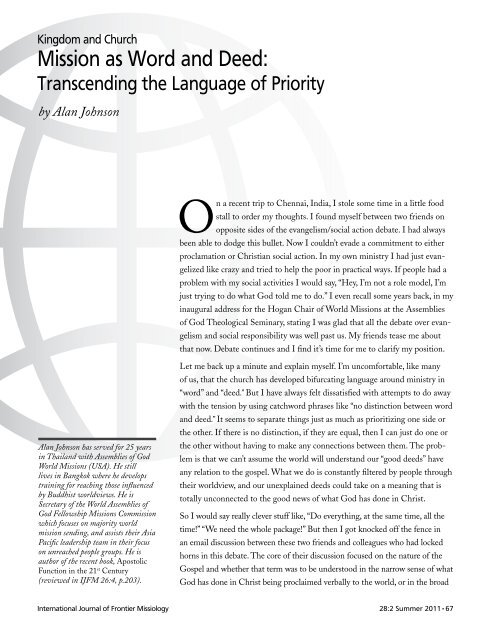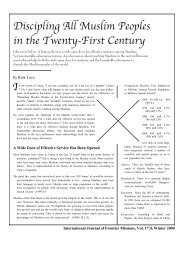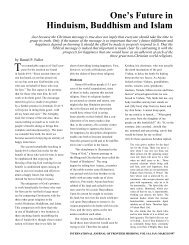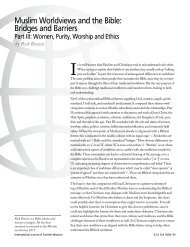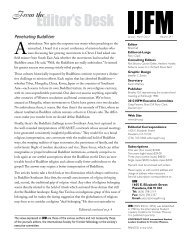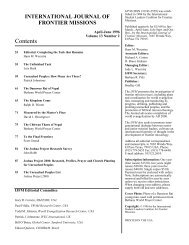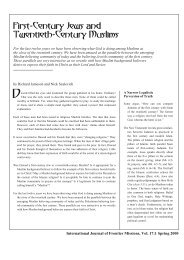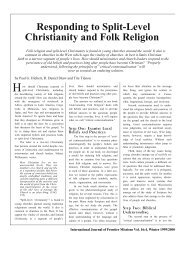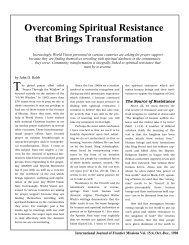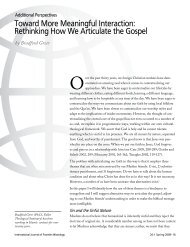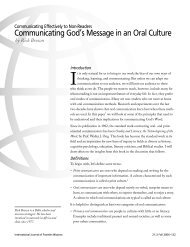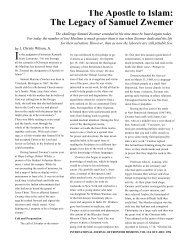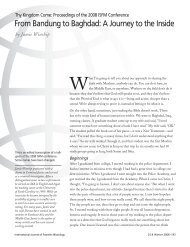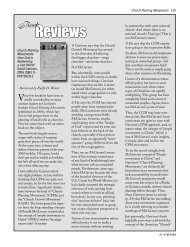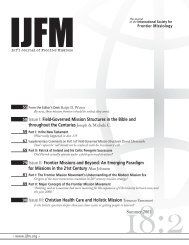Mission as Word and Deed: Transcending the Language of Priority
Mission as Word and Deed: Transcending the Language of Priority
Mission as Word and Deed: Transcending the Language of Priority
You also want an ePaper? Increase the reach of your titles
YUMPU automatically turns print PDFs into web optimized ePapers that Google loves.
Kingdom <strong>and</strong> Church<br />
<strong>Mission</strong> <strong>as</strong> <strong>Word</strong> <strong>and</strong> <strong>Deed</strong>:<br />
<strong>Transcending</strong> <strong>the</strong> <strong>Language</strong> <strong>of</strong> <strong>Priority</strong><br />
by Alan Johnson<br />
On a recent trip to Chennai, India, I stole some time in a little food<br />
stall to order my thoughts. I found myself between two friends on<br />
opposite sides <strong>of</strong> <strong>the</strong> evangelism/social action debate. I had always<br />
been able to dodge this bullet. Now I couldn’t evade a commitment to ei<strong>the</strong>r<br />
proclamation or Christian social action. In my own ministry I had just evangelized<br />
like crazy <strong>and</strong> tried to help <strong>the</strong> poor in practical ways. If people had a<br />
problem with my social activities I would say, “Hey, I’m not a role model, I’m<br />
just trying to do what God told me to do.” I even recall some years back, in my<br />
inaugural address for <strong>the</strong> Hogan Chair <strong>of</strong> World <strong>Mission</strong>s at <strong>the</strong> Assemblies<br />
<strong>of</strong> God Theological Seminary, stating I w<strong>as</strong> glad that all <strong>the</strong> debate over evangelism<br />
<strong>and</strong> social responsibility w<strong>as</strong> well p<strong>as</strong>t us. My friends te<strong>as</strong>e me about<br />
that now. Debate continues <strong>and</strong> I find it’s time for me to clarify my position.<br />
Alan Johnson h<strong>as</strong> served for 25 years<br />
in Thail<strong>and</strong> with Assemblies <strong>of</strong> God<br />
World <strong>Mission</strong>s (USA). He still<br />
lives in Bangkok where he develops<br />
training for reaching those influenced<br />
by Buddhist worldviews. He is<br />
Secretary <strong>of</strong> <strong>the</strong> World Assemblies <strong>of</strong><br />
God Fellowship <strong>Mission</strong>s Commission<br />
which focuses on majority world<br />
mission sending, <strong>and</strong> <strong>as</strong>sists <strong>the</strong>ir Asia<br />
Pacific leadership team in <strong>the</strong>ir focus<br />
on unreached people groups. He is<br />
author <strong>of</strong> <strong>the</strong> recent book, Apostolic<br />
Function in <strong>the</strong> 21 st Century<br />
(reviewed in IJFM 26:4, p.203).<br />
Let me back up a minute <strong>and</strong> explain myself. I’m uncomfortable, like many<br />
<strong>of</strong> us, that <strong>the</strong> church h<strong>as</strong> developed bifurcating language around ministry in<br />
“word” <strong>and</strong> “deed.” But I have always felt dissatisfied with attempts to do away<br />
with <strong>the</strong> tension by using catchword phr<strong>as</strong>es like “no distinction between word<br />
<strong>and</strong> deed.” It seems to separate things just <strong>as</strong> much <strong>as</strong> prioritizing one side or<br />
<strong>the</strong> o<strong>the</strong>r. If <strong>the</strong>re is no distinction, if <strong>the</strong>y are equal, <strong>the</strong>n I can just do one or<br />
<strong>the</strong> o<strong>the</strong>r without having to make any connections between <strong>the</strong>m. The problem<br />
is that we can’t <strong>as</strong>sume <strong>the</strong> world will underst<strong>and</strong> our “good deeds” have<br />
any relation to <strong>the</strong> gospel. What we do is constantly filtered by people through<br />
<strong>the</strong>ir worldview, <strong>and</strong> our unexplained deeds could take on a meaning that is<br />
totally unconnected to <strong>the</strong> good news <strong>of</strong> what God h<strong>as</strong> done in Christ.<br />
So I would say really clever stuff like, “Do everything, at <strong>the</strong> same time, all <strong>the</strong><br />
time!” “We need <strong>the</strong> whole package!” But <strong>the</strong>n I got knocked <strong>of</strong>f <strong>the</strong> fence in<br />
an email discussion between <strong>the</strong>se two friends <strong>and</strong> colleagues who had locked<br />
horns in this debate. The core <strong>of</strong> <strong>the</strong>ir discussion focused on <strong>the</strong> nature <strong>of</strong> <strong>the</strong><br />
Gospel <strong>and</strong> whe<strong>the</strong>r that term w<strong>as</strong> to be understood in <strong>the</strong> narrow sense <strong>of</strong> what<br />
God h<strong>as</strong> done in Christ being proclaimed verbally to <strong>the</strong> world, or in <strong>the</strong> broad<br />
International Journal <strong>of</strong> Frontier Missiology 28:2 Summer 2011•67
68<br />
<strong>Mission</strong> <strong>as</strong> <strong>Word</strong> <strong>and</strong> <strong>Deed</strong>: <strong>Transcending</strong> <strong>the</strong> <strong>Language</strong> <strong>of</strong> <strong>Priority</strong><br />
A Theological Perspective:<br />
Matrices <strong>and</strong> Explosion<br />
If we are going to resist <strong>the</strong> temptation<br />
to argue from opposite poles, how are<br />
we to proceed What I am proposing<br />
here is a possible way toward constructive<br />
dialogue that helps build a more<br />
integrative strategy <strong>and</strong> practice. I besense<br />
<strong>of</strong> embracing all expressions that<br />
are consonant with God’s reign.<br />
So, <strong>the</strong>re I w<strong>as</strong> parked in a food stall in<br />
Chennai, India, trying to sketch out a<br />
solution for <strong>the</strong>se two friends. I had two<br />
goals in mind. The first w<strong>as</strong> to provide<br />
some concepts to help build bridges<br />
between those who find <strong>the</strong>mselves<br />
more on one side <strong>of</strong> <strong>the</strong> continuum than<br />
<strong>the</strong> o<strong>the</strong>r. The second is to bring some<br />
analytical perspectives that can potentially<br />
help to clarify issues <strong>as</strong> people work<br />
things out in real-time on <strong>the</strong> ground in<br />
ministry. As I pressed forward to answer<br />
my two friends, I had to review multiple<br />
mission <strong>the</strong>ologians <strong>and</strong> church historians,<br />
some which I mention herein. But I<br />
pr<strong>of</strong>ited most from <strong>the</strong> recent writing <strong>of</strong><br />
Christopher Wright, who perceptively<br />
led me beyond <strong>the</strong> language <strong>of</strong> priority<br />
to a new terminology that integrates<br />
evangelism <strong>and</strong> social action. But before<br />
hearing Wright I think we need to unpack<br />
some <strong>of</strong> our conceptual tendencies.<br />
Moving Away from Ideal<br />
Type Polarities<br />
What I have found is that most <strong>of</strong>ten<br />
our discussion about <strong>the</strong> evangelism/social<br />
action nexus is carried out in abstract<br />
terms. Almost like <strong>the</strong> Weberian ideal<br />
types, 1 we tend to pr<strong>of</strong>ile <strong>the</strong> positions<br />
<strong>as</strong> polar opposites. On one end you have<br />
people who only preach <strong>the</strong> Gospel <strong>and</strong><br />
do nothing to help people along in this<br />
world, <strong>and</strong> on <strong>the</strong> o<strong>the</strong>r you have people<br />
who do helpful things for o<strong>the</strong>rs <strong>and</strong><br />
never say a word about Christ. Reality is<br />
<strong>of</strong> course more complicated because <strong>the</strong><br />
preachers usually get involved in people’s<br />
lives, <strong>and</strong> visa-versa, <strong>the</strong> helpers <strong>of</strong>ten<br />
talk <strong>of</strong> <strong>the</strong>ir faith. Very few at <strong>the</strong> end <strong>of</strong><br />
<strong>the</strong> day would be willing to affirm only<br />
proclaiming <strong>the</strong> Gospel or only doing<br />
social action without reference to <strong>the</strong><br />
good news <strong>of</strong> Jesus.<br />
I see two important points here. First,<br />
for <strong>the</strong> sake <strong>of</strong> developing argument we<br />
tend to utilize abstract scenarios, but<br />
in real-time everyday life we are much<br />
more integrated. Second, many <strong>of</strong> <strong>the</strong><br />
pressing issues are not located in that<br />
<strong>the</strong>ological zone where we interpret <strong>the</strong><br />
biblical data about <strong>the</strong> gospel <strong>and</strong> God’s<br />
concern for human welfare on <strong>the</strong> earth,<br />
but ra<strong>the</strong>r in <strong>the</strong> real-time practice zone<br />
<strong>of</strong> actual concrete ministry situations. So<br />
it is not so much a <strong>the</strong>oretical matter <strong>of</strong><br />
what takes priority, <strong>as</strong> it is a contextual<br />
matter <strong>of</strong> what we are doing or should<br />
be doing in any particular place or<br />
circumstance. Underlying all this debate<br />
are actual experiences (<strong>of</strong>ten negative)<br />
which color <strong>the</strong> contemporary discussion<br />
on best practices. It seems to me<br />
that if folks who lean to one side or <strong>the</strong><br />
o<strong>the</strong>r saw more people living out <strong>the</strong><br />
middle ground (“do everything all <strong>the</strong><br />
The polar positions<br />
are not helpful<br />
starting points for<br />
discussion<br />
time”), <strong>the</strong>y would feel less compelled to<br />
emph<strong>as</strong>ize one side <strong>of</strong> <strong>the</strong> o<strong>the</strong>r. They<br />
would be quite happy pragmatists who<br />
preach <strong>and</strong> serve (<strong>and</strong> many journals<br />
would go out <strong>of</strong> business because<br />
nobody would be writing long essays<br />
about <strong>the</strong> subject!). But <strong>the</strong>re is enough<br />
problematic reality between both ends <strong>of</strong><br />
<strong>the</strong> continuum to keep <strong>the</strong> ink flowing.<br />
My suggestion here is that <strong>the</strong> polar<br />
positions are not helpful starting points<br />
for discussion <strong>and</strong> that it will be more<br />
productive to find tools that are helpful<br />
in discerning how things are played out<br />
in concrete ministry situations.<br />
gin with three <strong>the</strong>ological premises we<br />
all can generally agree on, but I want<br />
to link <strong>the</strong>m to two new inter pretive<br />
constructs that might help bring clarity<br />
to various ministry scenarios.<br />
1. The term euangelion (good<br />
news, gospel) w<strong>as</strong> used in<br />
secular Greek to describe an<br />
event that changed <strong>the</strong> world,<br />
thus it w<strong>as</strong> good news. The<br />
gospel writers appropriated<br />
this term to describe what<br />
God h<strong>as</strong> done in Jesus Christ;<br />
this covers <strong>the</strong> entire redemptive<br />
event from his birth<br />
through his <strong>as</strong>cension <strong>and</strong> <strong>the</strong><br />
pouring out <strong>of</strong> <strong>the</strong> Spirit.<br />
2. This good news is <strong>the</strong>n announced,<br />
<strong>the</strong> verb kerysso meaning<br />
‘to proclaim <strong>as</strong> a herald’. For<br />
those who experience this good<br />
news personally, <strong>the</strong>y <strong>the</strong>n herald<br />
<strong>the</strong> good news <strong>of</strong> salvation<br />
<strong>and</strong> <strong>the</strong> coming <strong>of</strong> <strong>the</strong> new age.<br />
3. Good news calls for an individual<br />
response, but results<br />
in a corporate entity, <strong>the</strong> new<br />
community <strong>of</strong> faith. These local<br />
expressions <strong>of</strong> Christ’s body<br />
scattered throughout <strong>the</strong> world<br />
bear witness to <strong>the</strong> good news<br />
<strong>and</strong> announce it to <strong>the</strong> world<br />
in word <strong>and</strong> deed <strong>as</strong> <strong>the</strong>y live<br />
under God’s rule.<br />
I now want to run <strong>the</strong>se b<strong>as</strong>ic New Testament<br />
ide<strong>as</strong> through two interpretive<br />
grids. The first comes from Paul Johnson<br />
in his History <strong>of</strong> Christianity, where he<br />
introduces <strong>the</strong> notion <strong>of</strong> “matrices”<br />
(sing., matrix) that are inherent to <strong>the</strong><br />
Christian faith. The term matrix is<br />
used in a number <strong>of</strong> different fields,<br />
but its original meaning had to do<br />
with <strong>the</strong> source or origin from which<br />
something takes form or develops.<br />
The idea <strong>of</strong> matrices emerges from<br />
Johnson’s interpretive sweep <strong>of</strong><br />
Christian history in which he notes<br />
how <strong>the</strong> faith simultaneously unle<strong>as</strong>hes<br />
both vital spontaneous forces<br />
<strong>as</strong> well <strong>as</strong> institutionalizing tendencies.<br />
The tension between spontaneity<br />
International Journal <strong>of</strong> Frontier Missiology
<strong>and</strong> <strong>the</strong> existing institutional order is<br />
endemic to Christianity, but he roots<br />
this tension not just in <strong>the</strong> innovations<br />
<strong>the</strong>mselves, but in <strong>the</strong> very ‘matrices’<br />
<strong>of</strong> our faith <strong>as</strong> <strong>the</strong> gospel encounters<br />
each new context (1976:234, 252).<br />
Johnson uses his <strong>as</strong>tute historical<br />
perspective to help us see why our<br />
faith h<strong>as</strong> <strong>the</strong> potential for manifold<br />
interpretation <strong>and</strong> action. He describes<br />
<strong>the</strong> teaching <strong>of</strong> Jesus <strong>as</strong> “more a series<br />
<strong>of</strong> glimpses, or matrices, a collection<br />
<strong>of</strong> insights, ra<strong>the</strong>r than a code <strong>of</strong><br />
doctrine. It invites comment, interpretation,<br />
elaboration <strong>and</strong> constructive<br />
argument, <strong>and</strong> is <strong>the</strong> starting point<br />
for rival, though compatible, lines <strong>of</strong><br />
inquiry. It is not a summa <strong>the</strong>ologica,<br />
or indeed ethica, but <strong>the</strong> b<strong>as</strong>is from<br />
which an endless series <strong>of</strong> summae<br />
can be <strong>as</strong>sembled” (1976:28). He<br />
notes how “<strong>the</strong> <strong>the</strong>ological wisdom <strong>of</strong><br />
Christ, in providing a whole series <strong>of</strong><br />
matrices for future experiment, w<strong>as</strong><br />
demonstrated again <strong>and</strong> again <strong>as</strong> new<br />
varieties <strong>of</strong> Christian action came into<br />
existence, flourished <strong>and</strong> declined”<br />
(1976:234). What’s important for our<br />
subject at h<strong>and</strong> is to see in Johnson’s<br />
insight just how <strong>the</strong> ‘matrices’ <strong>of</strong> our<br />
gospel can lead to “rival, though compatible,<br />
lines <strong>of</strong> inquiry”, to “varieties<br />
<strong>of</strong> Christian action,” <strong>and</strong> to<br />
“future experiment.”<br />
The second perspective comes from<br />
<strong>the</strong> work <strong>of</strong> Lesslie Newbigin in<br />
his chapter entitled “The Logic <strong>of</strong><br />
<strong>Mission</strong>” in The Gospel in a Pluralist<br />
Society. Newbigin challenges <strong>the</strong> idea<br />
<strong>of</strong> <strong>the</strong> mission <strong>of</strong> <strong>the</strong> church <strong>as</strong> purely<br />
obedience to a comm<strong>and</strong>. He suggests<br />
that <strong>the</strong> New Testament evidence<br />
argues for a mission that begins “with<br />
a kind <strong>of</strong> explosion <strong>of</strong> joy. The news<br />
that <strong>the</strong> rejected <strong>and</strong> crucified Jesus is<br />
alive is something that cannot possibly<br />
be suppressed. It must be told. Who<br />
could be silent about such a fact The<br />
mission <strong>of</strong> <strong>the</strong> Church in <strong>the</strong> pages <strong>of</strong><br />
<strong>the</strong> New Testament is more like <strong>the</strong><br />
fallout from a v<strong>as</strong>t explosion, a radioactive<br />
fallout which is not lethal but<br />
life-giving” (1989:116).<br />
What happens if we interpret <strong>the</strong>se<br />
New Testament premises through <strong>the</strong><br />
ide<strong>as</strong> <strong>of</strong> “matrices” <strong>and</strong> “explosion”<br />
1. One matrix that is always<br />
produced when <strong>the</strong> Gospel is<br />
accepted <strong>and</strong> a community <strong>of</strong><br />
faith comes into being is an<br />
explosion <strong>of</strong> joy to shout <strong>the</strong><br />
message. Just <strong>as</strong> any explosion<br />
radiates from <strong>the</strong> center out to<br />
<strong>the</strong> margins, so we see in <strong>the</strong><br />
New Testament that centrifugal<br />
movement where <strong>the</strong> good<br />
news extends from Jerusalem to<br />
<strong>the</strong> uttermost parts <strong>of</strong> <strong>the</strong> earth<br />
among every tribe <strong>and</strong> tongue.<br />
2. A second matrix is an explosion<br />
<strong>of</strong> caring. As God’s people,<br />
living under his rule, it brings<br />
us into a collision course with<br />
all that is not right in <strong>the</strong> world.<br />
Note in Genesis 18:19 that<br />
God’s choosing <strong>of</strong> Abraham<br />
to bless all <strong>the</strong> nations also<br />
includes “keeping <strong>the</strong> way <strong>of</strong><br />
<strong>the</strong> Lord by doing what is right<br />
<strong>and</strong> just.” This matrix <strong>of</strong> caring<br />
will always challenge <strong>the</strong> status<br />
quo <strong>of</strong> <strong>the</strong> world system <strong>and</strong><br />
its acceptance <strong>of</strong> <strong>the</strong> abuse <strong>of</strong><br />
power, corruption <strong>and</strong> violence.<br />
Alan Johnson 69<br />
The mission <strong>of</strong> <strong>the</strong> Church in <strong>the</strong> pages <strong>of</strong> <strong>the</strong><br />
New Testament is more like <strong>the</strong> fallout from a<br />
v<strong>as</strong>t explosion. (Lesslie Newbigin)<br />
Because <strong>the</strong>se matrices are not unchanging<br />
codes fixed by one single<br />
context, but ra<strong>the</strong>r provide <strong>the</strong> energy<br />
for unending creativity to generate<br />
new responses in new situations, we<br />
are not limited to only New Testament<br />
scenarios. Thus <strong>the</strong> matrix <strong>of</strong> shouting<br />
<strong>the</strong> good news meant that when distinct<br />
ethnolinguistic peoples without<br />
a gospel witness were encountered,<br />
a new burst <strong>of</strong> energy <strong>and</strong> translation<br />
w<strong>as</strong> generated to address this.<br />
Although we have no record <strong>of</strong> Jesus<br />
rescuing babies who had been chained<br />
to die in <strong>the</strong> wilderness, <strong>the</strong> matrix <strong>of</strong><br />
caring extended into new contexts <strong>and</strong><br />
led early Christians to rescue <strong>the</strong>se<br />
babies in defiance <strong>of</strong> social norms.<br />
Different Groups Do<br />
Different Things<br />
The more I have thought about <strong>the</strong><br />
relationship between evangelism <strong>and</strong><br />
social responsibility, <strong>the</strong> more I’m<br />
convinced that much <strong>of</strong> tension can be<br />
resolved when two sets <strong>of</strong> conditions,<br />
two “starting points”, are kept in view.<br />
The first is an appreciation for different<br />
kinds <strong>of</strong> groups. The second is <strong>the</strong><br />
presence <strong>and</strong> vitality <strong>of</strong> <strong>the</strong> church in a<br />
given social setting. I will discuss <strong>the</strong>m<br />
in this order.<br />
First, let me affirm that at <strong>the</strong> level <strong>of</strong><br />
<strong>the</strong> individual Christian in his web <strong>of</strong><br />
personal relationships, sharing good<br />
news <strong>and</strong> caring in Jesus name are<br />
done holistically, <strong>of</strong>ten simultaneously,<br />
<strong>and</strong> not sequentially. <strong>Word</strong> <strong>and</strong> deed<br />
are wrapped toge<strong>the</strong>r <strong>and</strong> hard to unpack<br />
in such close relations. Winter’s<br />
point that in family you never choose<br />
between evangelism <strong>and</strong> caring for<br />
needs is well taken (1990:99). In an<br />
ongoing relationship over time deeds<br />
are interpreted by words, <strong>and</strong> testimony<br />
to <strong>the</strong> Gospel is confirmed by<br />
our deeds.<br />
However, when you move outside <strong>the</strong><br />
boundaries <strong>of</strong> individuals <strong>and</strong> kinship<br />
relations <strong>the</strong> dynamics begin to<br />
change. We can expect <strong>the</strong> balance<br />
between word <strong>and</strong> deed to change<br />
when we consider local churches<br />
(modalities), mission teams (apostolic<br />
b<strong>and</strong>s that function <strong>as</strong> sodalities),<br />
parachurch organizations, or faithb<strong>as</strong>ed<br />
NGOs. We run into problems<br />
when we try to treat all <strong>of</strong> <strong>the</strong>se entities<br />
in <strong>the</strong> same way <strong>and</strong> hold <strong>the</strong>m to<br />
<strong>the</strong> same balance <strong>of</strong> word <strong>and</strong> deed.<br />
The relationship between evangelism<br />
<strong>and</strong> social action is clarified if we<br />
allow that different kinds <strong>of</strong> organizational<br />
forms h<strong>and</strong>le <strong>the</strong>se two<br />
28:2 Summer 2011
70<br />
<strong>Mission</strong> <strong>as</strong> <strong>Word</strong> <strong>and</strong> <strong>Deed</strong>: <strong>Transcending</strong> <strong>the</strong> <strong>Language</strong> <strong>of</strong> <strong>Priority</strong><br />
matrices in different ways. They will<br />
do some things better than o<strong>the</strong>rs.<br />
It’s underst<strong>and</strong>able that for groups<br />
or organizations to be successful <strong>the</strong>y<br />
need to do some things to <strong>the</strong> exclusion<br />
<strong>of</strong> o<strong>the</strong>rs. That organizations will<br />
focus only on evangelism, or only on<br />
Christian social action, is not at all<br />
strange, nor does it mean <strong>the</strong>y deny<br />
<strong>the</strong> importance <strong>of</strong> <strong>the</strong> part that is not<br />
<strong>the</strong>ir focus; it’s simply a matter <strong>of</strong><br />
staying on course with <strong>the</strong>ir re<strong>as</strong>on<br />
for being.<br />
It is a bit more complex when we make<br />
a distinction between local churches<br />
<strong>and</strong> mission teams. While some people<br />
feel uncomfortable with this, I think it<br />
is more analytically powerful <strong>and</strong> strategically<br />
sound to see <strong>the</strong> mission team<br />
sodality <strong>as</strong> functioning with a much<br />
narrower agenda than local church<br />
modalities. Local churches have “family”<br />
type characteristics, work primarily<br />
within <strong>the</strong>ir own sociocultural sphere,<br />
have a multiplicity <strong>of</strong> giftings, <strong>and</strong> <strong>the</strong>ir<br />
members are embedded in relationships<br />
within <strong>the</strong> community. To evangelize<br />
<strong>and</strong> care in Jesus name should be<br />
<strong>the</strong> DNA <strong>of</strong> all local churches, <strong>and</strong><br />
it’s critical <strong>the</strong>y develop structures or<br />
mechanisms to both evangelize <strong>and</strong><br />
care <strong>as</strong> widely <strong>as</strong> possible. If for instance<br />
one <strong>of</strong> those mechanisms focuses only<br />
on social action, it still flows out <strong>of</strong> <strong>the</strong><br />
life <strong>of</strong> <strong>the</strong> local church <strong>and</strong> its witness<br />
remains holistic in nature. In this sense,<br />
what individuals do in terms <strong>of</strong> witness<br />
<strong>and</strong> caring in <strong>the</strong>ir relationships is<br />
expressed on a wider canv<strong>as</strong> <strong>of</strong> a local<br />
church <strong>and</strong> its community.<br />
When we consider <strong>the</strong> mission team<br />
sodality, I underst<strong>and</strong> its function in a<br />
narrower sense, defined cl<strong>as</strong>sically by<br />
<strong>the</strong> Pauline notion <strong>of</strong> taking Christ<br />
where he is not known. The priority<br />
is <strong>the</strong> evangelistic matrix <strong>and</strong> <strong>the</strong> goal<br />
is making disciples that form local<br />
church modalities <strong>and</strong> <strong>the</strong>n bear witness<br />
<strong>and</strong> live out <strong>the</strong> values <strong>of</strong> God’s<br />
rule. Where<strong>as</strong> local churches do both<br />
things through <strong>the</strong> life <strong>and</strong> witness<br />
<strong>of</strong> <strong>the</strong>ir individual members <strong>and</strong> <strong>the</strong><br />
ministry expressions <strong>of</strong> <strong>the</strong> church, <strong>the</strong><br />
primary purpose <strong>of</strong> <strong>the</strong> apostolic b<strong>and</strong><br />
is to make disciples <strong>and</strong> form local<br />
congregations. <strong>Mission</strong> teams may do<br />
many things that allow <strong>the</strong>m to stay<br />
on <strong>the</strong> ground in a given location, but<br />
<strong>the</strong> focus is narrow.<br />
Different Starting Points Need<br />
Different Kinds <strong>of</strong> Action<br />
Even if we own that <strong>the</strong>se different<br />
kinds <strong>of</strong> groups (in this c<strong>as</strong>e local<br />
church modalities <strong>and</strong> mission team<br />
sodalities) have different kinds <strong>of</strong><br />
priorities <strong>and</strong> do different things<br />
well, we also must face a second<br />
I’m convinced that<br />
much <strong>of</strong> <strong>the</strong> tension<br />
can be resolved<br />
strategic factor: <strong>the</strong> presence or<br />
absence <strong>of</strong> Christians, churches, <strong>and</strong><br />
church movements.<br />
Let me syn<strong>the</strong>size a sentence from<br />
<strong>the</strong> <strong>the</strong>ological perspective above <strong>and</strong><br />
<strong>the</strong>n vary <strong>the</strong> scenario so that we can<br />
see how it plays out in terms <strong>of</strong> <strong>the</strong><br />
relationship between evangelism <strong>and</strong><br />
social action.<br />
God desires to see humans redeemed<br />
<strong>and</strong> reconciled to him <strong>and</strong> to live out<br />
<strong>the</strong> values <strong>of</strong> heaven under his rule in<br />
a community <strong>of</strong> faith that is salt <strong>and</strong><br />
light to <strong>the</strong> world.<br />
Note that you cannot separate <strong>the</strong><br />
different <strong>as</strong>pects <strong>of</strong> this statement<br />
since it’s a cycle, where those who experience<br />
reconciliation are announcing<br />
<strong>the</strong> good news, <strong>the</strong>n birthing new<br />
people into <strong>the</strong> community <strong>of</strong> faith,<br />
<strong>and</strong> who in turn are salt <strong>and</strong> light.<br />
But how do <strong>the</strong> different <strong>as</strong>pects play<br />
out in different contexts<br />
What happens if you are st<strong>and</strong>ing in <strong>the</strong><br />
middle <strong>of</strong> 80 million people who don’t<br />
know Christ, or who may have a miniscule<br />
number <strong>of</strong> Christians, <strong>and</strong> no viable<br />
church movements In this scenario our<br />
<strong>the</strong>ological statement takes on a more<br />
sequential feel because you have to announce<br />
<strong>the</strong> good news in order to build<br />
<strong>the</strong> community <strong>of</strong> faith that will in turn<br />
live out <strong>the</strong> message. That proclamation<br />
may indeed be wrapped in loving<br />
Christian social action, but in such a<br />
circumstance, explanation <strong>of</strong> <strong>the</strong> gospel<br />
is needed in order to make sense <strong>of</strong> that<br />
action, <strong>and</strong> <strong>the</strong> overall priority will be<br />
on evangelism <strong>and</strong> making disciples into<br />
faith communities.<br />
Let’s change <strong>the</strong> scenario again. What<br />
if you are in a place with many forms<br />
<strong>of</strong> Christianity, much <strong>of</strong> it nominal,<br />
with large viable church movements<br />
amidst crying physical needs <strong>and</strong> all<br />
kinds And <strong>the</strong>se churches have nicely<br />
dressed folk sitting in little buildings<br />
on Sunday <strong>and</strong> going to heaven while<br />
<strong>the</strong>y ignore <strong>the</strong> marginalized outside<br />
<strong>the</strong>ir doors Here we have <strong>the</strong> critical<br />
function <strong>of</strong> waking up <strong>the</strong>se local<br />
church modalities to <strong>the</strong> fullness <strong>of</strong><br />
what <strong>the</strong> good news means.<br />
I need to make a few qualifying statements<br />
so I’m not misunderstood. First,<br />
to say that <strong>the</strong> work <strong>of</strong> <strong>the</strong> mission<br />
sodality h<strong>as</strong> <strong>the</strong> goal <strong>of</strong> planting <strong>the</strong><br />
church does not mean that <strong>the</strong> social<br />
concern it may be involved in is a<br />
“carrot on <strong>the</strong> stick” activity designed<br />
primarily to warm people up to hear<br />
about Jesus. It h<strong>as</strong> to be genuine love<br />
in Jesus’ name <strong>and</strong> because Jesus loves<br />
people, with no strings attached.<br />
Nei<strong>the</strong>r can this social concern be disconnected<br />
from who we are, because<br />
<strong>the</strong> “who we are” in Christ is what is<br />
driving our actions <strong>and</strong> that needs to<br />
be made clear.<br />
Second, when local churches express<br />
God’s comp<strong>as</strong>sion for <strong>the</strong> hurting in<br />
<strong>the</strong>ir local setting, it does not mean<br />
that <strong>the</strong>y ab<strong>and</strong>on evangelizing those<br />
who are non-Christians around <strong>the</strong>m<br />
<strong>as</strong> well. Christian social concern in a<br />
place with visible <strong>and</strong> vibrant forms <strong>of</strong><br />
International Journal <strong>of</strong> Frontier Missiology
Christian faith can enhance underst<strong>and</strong>ing<br />
<strong>of</strong> <strong>the</strong> gospel.<br />
Thirdly, we have to be careful not to<br />
export local church modality practices<br />
automatically into <strong>the</strong> sodality setting.<br />
It’s an uncritical <strong>and</strong> naïve use<br />
<strong>of</strong> method. It h<strong>as</strong> been my observation<br />
that many times local churches<br />
in <strong>the</strong> West that are not very socially<br />
active at all in <strong>the</strong>ir own setting, want<br />
to “do mission” by some kind <strong>of</strong> social<br />
action in a cross-cultural setting. This<br />
becomes problematic at several levels.<br />
If <strong>the</strong>y are going to a place that h<strong>as</strong><br />
churches <strong>and</strong> Christians, <strong>the</strong>ir efforts<br />
are <strong>of</strong>ten completely outside <strong>of</strong> existing<br />
church structures. They can damage<br />
<strong>the</strong> effort <strong>and</strong> morale <strong>of</strong> <strong>the</strong>se existing<br />
churches, or in o<strong>the</strong>r c<strong>as</strong>es, <strong>the</strong>y set a<br />
disempowering example <strong>of</strong> what social<br />
ministry is by implying it can only be<br />
done with funding from <strong>the</strong> West. If<br />
<strong>the</strong>y are going to a place with few or<br />
no Christians, <strong>the</strong>ir <strong>as</strong>sumption that<br />
people will “see Jesus” in <strong>the</strong>ir actions<br />
is unfounded. It’s an <strong>as</strong>sumption b<strong>as</strong>ed<br />
on <strong>the</strong>ir experience in <strong>the</strong>ir home<br />
setting where <strong>the</strong>re is more visible<br />
Christian faith <strong>and</strong> a common culture<br />
<strong>and</strong> worldview. It can have dis<strong>as</strong>trous<br />
consequences (like <strong>the</strong> accusation <strong>of</strong><br />
“buying” people to become Christians)<br />
ra<strong>the</strong>r than helping people underst<strong>and</strong><br />
more about <strong>the</strong> gospel.<br />
Back to Theology: Chris Wright’s<br />
Notion <strong>of</strong> Ultimacy<br />
Having dodged <strong>the</strong> bullet for so many<br />
years, <strong>and</strong> having remained highly<br />
involved both in evangelism <strong>and</strong><br />
social ministries, I personally have had<br />
no problem with using prioritizing<br />
language (i.e., first evangelism, <strong>the</strong>n<br />
social concern). Years ago during<br />
a discussion about <strong>the</strong> relationship<br />
between word <strong>and</strong> deed a friend said<br />
that logically, at <strong>the</strong> very le<strong>as</strong>t, <strong>the</strong>re<br />
h<strong>as</strong> to be a priority on evangelism since<br />
you can’t have Christian social action<br />
without <strong>the</strong>re being Christians. 2<br />
There are some, however, who find<br />
prioritizing language very problematic. 3<br />
Chris Wright <strong>of</strong>fers an alternative sug-<br />
gestion that is <strong>the</strong> best biblical <strong>and</strong> <strong>the</strong>ological<br />
b<strong>as</strong>is I have ever seen for avoiding<br />
bifurcating terminology. The material<br />
that follows is drawn from Wright’s<br />
The <strong>Mission</strong> <strong>of</strong> God chapters eight <strong>and</strong><br />
nine on <strong>the</strong> Exodus <strong>and</strong> Jubilee.<br />
Wright argues that God’s model <strong>of</strong><br />
redemption is <strong>the</strong> exodus event. The<br />
Hebrew verb ga’al at Ex. 6:6 <strong>and</strong> 15:13<br />
are <strong>the</strong> first occ<strong>as</strong>ions (with <strong>the</strong> exception<br />
<strong>of</strong> Gen. 48:16) <strong>of</strong> <strong>the</strong> language<br />
<strong>of</strong> redemption. When a person is <strong>the</strong><br />
subject <strong>of</strong> <strong>the</strong> verb <strong>the</strong> term is go’el<br />
(redeemer) (2006:266). The English<br />
word redeem from its Latin roots suggest<br />
a financial transaction where you<br />
‘buy something back.” But in ancient<br />
Israel <strong>the</strong> go’el had wider social dimensions<br />
<strong>as</strong>sociated with <strong>the</strong> dem<strong>and</strong>s<br />
<strong>of</strong> kinship. The ‘kinsman protector’<br />
or ‘family champion’ w<strong>as</strong> involved<br />
in avenging shed blood, redeeming<br />
l<strong>and</strong> or slaves, <strong>and</strong> providing an heir<br />
(2006:266–67). ‘The go’el <strong>the</strong>n, w<strong>as</strong> a<br />
near kinsman who acted <strong>as</strong> protector,<br />
defender, avenger or rescuer for o<strong>the</strong>r<br />
members <strong>of</strong> <strong>the</strong> family, especially in<br />
situations <strong>of</strong> threat, loss, poverty or<br />
injustice” (2006:267).<br />
Wright <strong>as</strong>ks <strong>the</strong> question, “When<br />
God decided to act in <strong>the</strong> world <strong>and</strong><br />
in human history in a way that could<br />
be pictured <strong>as</strong> a go’el in action, what<br />
did he do” (2006: 268). He points<br />
out that <strong>the</strong> exodus shows political,<br />
economic, social, <strong>and</strong> spiritual<br />
dimensions. “In <strong>the</strong> exodus God<br />
responded to all <strong>the</strong> dimensions <strong>of</strong><br />
Israel’s need.[<strong>the</strong> exodus] effected real<br />
change in <strong>the</strong> people’s real historical<br />
situation <strong>and</strong> at <strong>the</strong> same time called<br />
<strong>the</strong>m into a real new relationship<br />
with <strong>the</strong> living God” (2006:271).<br />
He concludes that Exodus-shaped<br />
redemption dem<strong>and</strong>s Exodus-shaped<br />
mission (2006:275). He warns that<br />
<strong>the</strong>re are two interpretive options that<br />
fall short <strong>of</strong> this holistic missional<br />
Alan Johnson 71<br />
The objection is usually couched in terms <strong>of</strong> <strong>the</strong><br />
observation that . . . Paul did not campaign for<br />
<strong>the</strong> end <strong>of</strong> slavery<br />
hermeneutic: to concentrate on <strong>the</strong><br />
spiritual significance <strong>and</strong> marginalize<br />
<strong>the</strong> political, economic, <strong>and</strong> social<br />
dimensions; or to concentrate on <strong>the</strong><br />
latter so that <strong>the</strong> spiritual dimension is<br />
lost (2006:276).<br />
Wright begins <strong>the</strong> chapter on jubilee<br />
by noting that <strong>the</strong> exodus w<strong>as</strong> a single<br />
historical event. God w<strong>as</strong> concerned<br />
that its b<strong>as</strong>ic principles be worked out<br />
in Israel’s everyday life. “There needed<br />
to be an ongoing commitment to economic<br />
<strong>and</strong> social justice, freedom from<br />
oppression, <strong>and</strong> due acknowledgement<br />
<strong>of</strong> God through covenant loyalty <strong>and</strong><br />
worship” (2006:289). Wright says<br />
that if <strong>the</strong> exodus w<strong>as</strong> God’s idea <strong>of</strong><br />
redemption, <strong>the</strong>n <strong>the</strong> jubilee found<br />
in Leviticus 25 w<strong>as</strong> God’s idea <strong>of</strong><br />
restoration (2006:290). After working<br />
through <strong>the</strong> details <strong>of</strong> <strong>the</strong> institution<br />
he <strong>the</strong>n looks at its evangelistic, ethical,<br />
<strong>and</strong> eschatological implications,<br />
concluding that “<strong>the</strong> wholeness <strong>of</strong> <strong>the</strong><br />
jubilee model embraces <strong>the</strong> wholeness<br />
<strong>of</strong> <strong>the</strong> church’s evangelistic mission,<br />
its personal <strong>and</strong> social ethics <strong>and</strong> its<br />
future hope” (2006:300).<br />
The next twenty pages in this chapter<br />
in Wright are critical, but I cannot<br />
produce <strong>the</strong> argument in detail here.<br />
What Wright does m<strong>as</strong>terfully is to<br />
respond to <strong>the</strong> objection that New<br />
Testament mission is only evangelistic<br />
<strong>and</strong> not holistic. He not only responds<br />
to this objection, he also sets out a<br />
perspective that embraces both evangelism<br />
<strong>and</strong> holism.<br />
The objection is usually couched in<br />
terms <strong>of</strong> <strong>the</strong> observation that Jesus<br />
did not get involved in politics, <strong>and</strong><br />
Paul did not campaign for <strong>the</strong> end <strong>of</strong><br />
slavery, so <strong>the</strong>refore is not New Testament<br />
mission to focus on evangelism<br />
(2006:303). Wright answers <strong>the</strong>se<br />
objections on hermeneutical, historical<br />
<strong>and</strong> <strong>the</strong>ological grounds. I want to draw<br />
28:2 Summer 2011
72<br />
<strong>Mission</strong> <strong>as</strong> <strong>Word</strong> <strong>and</strong> <strong>Deed</strong>: <strong>Transcending</strong> <strong>the</strong> <strong>Language</strong> <strong>of</strong> <strong>Priority</strong><br />
on just two <strong>of</strong> his points. First, he says<br />
that it is a false hermeneutic “to argue<br />
that whatever <strong>the</strong> New Testament tells<br />
us about <strong>the</strong> mission <strong>of</strong> <strong>the</strong> followers <strong>of</strong><br />
Christ cancels out what we already know<br />
about <strong>the</strong> mission <strong>of</strong> God’s people from<br />
<strong>the</strong> Old Testament” (304). 4 Second, he<br />
looks at <strong>the</strong> centrality <strong>of</strong> <strong>the</strong> cross, <strong>the</strong>n<br />
unpacks all <strong>of</strong> God’s purpose through<br />
<strong>the</strong> cross, <strong>and</strong> <strong>the</strong>n shows how <strong>the</strong> cross<br />
must be <strong>the</strong> center <strong>of</strong> our mission: “The<br />
fact is that sin <strong>and</strong> evil constitute bad<br />
news in every area <strong>of</strong> life on this planet.<br />
The redemptive work <strong>of</strong> God through<br />
<strong>the</strong> cross <strong>of</strong> Christ is good news for<br />
every area <strong>of</strong> life on earth that h<strong>as</strong> been<br />
touched by sin, which means every<br />
area <strong>of</strong> life. Bluntly, we need a holistic<br />
gospel because <strong>the</strong> world is in a holistic<br />
mess” (2006:315).<br />
He <strong>the</strong>n turns to examine <strong>the</strong> issue <strong>of</strong><br />
primacy/priority between evangelism<br />
<strong>and</strong> holistic mission. B<strong>as</strong>ed on his<br />
<strong>the</strong>ological work with <strong>the</strong> exodus,<br />
jubilee, <strong>and</strong> <strong>the</strong> cross, he suggests that<br />
<strong>the</strong> notion <strong>of</strong> “ultimacy” does better<br />
at leading us towards more integrated<br />
practice. Here is a brief summary<br />
<strong>of</strong> what this ‘ultimacy’ looks like<br />
(2006:317–319):<br />
• Think <strong>of</strong> mission <strong>as</strong> a whole<br />
circle <strong>of</strong> all <strong>the</strong> needs <strong>and</strong><br />
opportunities that God sends us<br />
to address in <strong>the</strong> world.<br />
• If you analyze a particular local<br />
context, it will reveal a complex<br />
web <strong>of</strong> interconnected factors<br />
constituting <strong>the</strong> whole range <strong>of</strong><br />
brokenness, sin, <strong>and</strong> evil across<br />
<strong>the</strong> entire human dimension.<br />
• The key question <strong>the</strong>n is,<br />
“What constitutes <strong>the</strong> good<br />
news <strong>of</strong> <strong>the</strong> biblical gospel in<br />
this whole circle <strong>of</strong> interlocking<br />
presenting needs <strong>and</strong><br />
underlying causes” (318).<br />
• Virtually any starting point can<br />
be appropriate, depending on<br />
what is most pressing, so you<br />
enter <strong>the</strong> circle anywhere.<br />
• But “ultimately” we must not rest<br />
content until we have included<br />
within our own missional<br />
response <strong>the</strong> wholeness <strong>of</strong><br />
God’s missional response to<br />
<strong>the</strong> human predicament—<strong>and</strong><br />
that <strong>of</strong> course includes <strong>the</strong> good<br />
news <strong>of</strong> Christ, <strong>the</strong> cross <strong>and</strong><br />
resurrection, <strong>the</strong> forgiveness <strong>of</strong><br />
sin, <strong>the</strong> gift <strong>of</strong> eternal life that<br />
is <strong>of</strong>fered to men <strong>and</strong> women<br />
through our witness to <strong>the</strong><br />
gospel <strong>and</strong> <strong>the</strong> hope <strong>of</strong> God’s<br />
new creation” (319).<br />
When I first worked through this<br />
material it just jumped <strong>of</strong>f <strong>the</strong> page to<br />
me. It w<strong>as</strong> <strong>the</strong> first time I had found a<br />
way <strong>of</strong> expressing things that did not<br />
The notion <strong>of</strong><br />
“ultimacy” does better<br />
at leading us<br />
towards more<br />
integrated practice.<br />
let anyone <strong>of</strong>f <strong>the</strong> hook. To focus on<br />
only one side or <strong>the</strong> o<strong>the</strong>r is to have<br />
a defective <strong>and</strong> truncated mission.<br />
Because ultimacy keeps us focused on<br />
<strong>the</strong> Cross <strong>and</strong> how it addresses <strong>the</strong> full<br />
range <strong>of</strong> human brokenness, <strong>the</strong> need<br />
for priority language disappears.<br />
The Contemporary<br />
Trajectory: Problems in<br />
Trends <strong>and</strong> Applications<br />
As I noted above, much <strong>of</strong> <strong>the</strong><br />
debate on <strong>the</strong> relationship between<br />
evangelism <strong>and</strong> social action relates<br />
not to <strong>the</strong>ological issues but to how<br />
that relationship is played out in<br />
practice. From <strong>the</strong> fieldworker side,<br />
when you are in a place with few<br />
Christians <strong>and</strong> trying to preach <strong>the</strong><br />
gospel <strong>and</strong> plant <strong>the</strong> church, it is<br />
frustrating <strong>and</strong> even frightening to<br />
see people from local churches in<br />
<strong>the</strong> West who want to come <strong>and</strong>/or<br />
finance “social ministry” so <strong>the</strong>y can do<br />
mission. What you <strong>of</strong>ten find is that<br />
<strong>the</strong>y are not motivated <strong>the</strong>ologically,<br />
but ra<strong>the</strong>r by an issue, a technique or a<br />
trend that is currently popular <strong>and</strong> can<br />
raise interest <strong>and</strong> funds. There’s a loss<br />
<strong>of</strong> intentionality <strong>and</strong> commitment to<br />
<strong>the</strong> longevity <strong>of</strong> perspective required<br />
to announce why <strong>the</strong>y are doing what<br />
<strong>the</strong>y are doing. This kind <strong>of</strong> work<br />
retains <strong>the</strong> “form” but loses all <strong>the</strong><br />
heart <strong>and</strong> ends up becoming “mission<br />
<strong>as</strong> stuff that makes us feel good.” It<br />
voids <strong>the</strong> outworking <strong>of</strong> God’s mission<br />
priorities in a given place.<br />
Many cross-cultural workers in<br />
unreached people groups are seeing more<br />
<strong>and</strong> more visitors (<strong>and</strong> even new recruits<br />
to <strong>the</strong> mission) who are enamored by a<br />
particular social, economic or political<br />
issue ra<strong>the</strong>r than a vision <strong>of</strong> Jesus <strong>and</strong><br />
his glory among <strong>the</strong> nations. In <strong>the</strong> part<br />
<strong>of</strong> <strong>the</strong> world where I live we now have<br />
people contacting our team who want to<br />
come <strong>and</strong> free sex slaves in a one week<br />
mission trip. When you are st<strong>and</strong>ing in<br />
<strong>the</strong> middle <strong>of</strong> millions <strong>of</strong> lost people your<br />
heart cries out to such well-intentioned<br />
folks “Ple<strong>as</strong>e, preach <strong>the</strong> unsearchable<br />
riches <strong>of</strong> Christ!” Jesus is <strong>the</strong> pearl <strong>of</strong><br />
great price <strong>and</strong> only <strong>as</strong> people come to<br />
know him can l<strong>as</strong>ting change come to<br />
<strong>the</strong>ir social systems. We dare not demean<br />
<strong>the</strong> mission <strong>of</strong> God by doing stuff that<br />
makes us feel good. We can’t have our<br />
little forays out into <strong>the</strong> real world <strong>and</strong><br />
<strong>the</strong>n escape to our air-conditioned<br />
technology filled bedrooms, throw<br />
c<strong>and</strong>y at people in Jesus’ name, or video<br />
document naïve interventions that have<br />
failed before <strong>the</strong> plane lifts <strong>of</strong>f to return<br />
home. In some c<strong>as</strong>es, full-time crosscultural<br />
workers can become experts in<br />
playing <strong>the</strong> home b<strong>as</strong>e heart strings in<br />
order to keep a steady stream <strong>of</strong> teams<br />
<strong>and</strong> funds flowing. The missionary role<br />
devolves into managing visitors who<br />
want to “do missions” in <strong>the</strong> space <strong>of</strong><br />
a ten day trip. That is mission on our<br />
terms, not God’s costly mission.<br />
Of course, one can also reverse this<br />
scenario <strong>and</strong> see how field personnel<br />
deeply involved in caring for physical<br />
International Journal <strong>of</strong> Frontier Missiology
needs would feel when people come<br />
<strong>and</strong> just want to “get <strong>the</strong>m saved”<br />
<strong>and</strong> ready for heaven. What can be<br />
<strong>the</strong>ologically clear from one side or<br />
<strong>the</strong> o<strong>the</strong>r gets very tangled <strong>as</strong> it is<br />
played out on <strong>the</strong> ground. It’s why I<br />
<strong>of</strong>ten quip to my missionary colleagues<br />
that missions education is lifetime<br />
employment. There is so much<br />
confusion about notions <strong>of</strong> mission.<br />
Even after you explain something in a<br />
crystal clear f<strong>as</strong>hion people will go <strong>and</strong><br />
do <strong>the</strong> opposite because that is what<br />
mission is to <strong>the</strong>m, regardless <strong>of</strong> what<br />
<strong>the</strong> Bible says.<br />
So what do we do in <strong>the</strong> real world<br />
where people lean instinctively towards<br />
ei<strong>the</strong>r side <strong>of</strong> this evangelism/social<br />
concern issue I believe we must<br />
promote a more integrated picture <strong>of</strong><br />
mission. We need to talk in terms <strong>of</strong><br />
ultimacy, not just priority. It allows us<br />
to deal with people on <strong>the</strong> b<strong>as</strong>is <strong>of</strong> what<br />
h<strong>as</strong> fired <strong>the</strong>ir heart first. Whe<strong>the</strong>r it<br />
is evangelism or caring for <strong>the</strong> poor,<br />
in whatever relational interface we<br />
find ourselves with <strong>the</strong>m, we can start<br />
to build a more integrated picture <strong>of</strong><br />
God’s mission <strong>and</strong> <strong>the</strong>ir participation<br />
in it. The language <strong>of</strong> ultimacy keeps<br />
everything in view, helping our words<br />
make better sense, helping us to move<br />
towards better practice in our mission<br />
contexts, <strong>and</strong> giving this generation a<br />
more integral underst<strong>and</strong>ing <strong>of</strong> mission<br />
<strong>as</strong> word <strong>and</strong> deed. IJFM<br />
References<br />
Johnson, Paul<br />
1976 A History <strong>of</strong> Christianity. New<br />
York: Simon <strong>and</strong> Schuster.<br />
Newbigin, Lesslie<br />
1989 The Gospel in a Pluralist Society.<br />
Gr<strong>and</strong> Rapids, Michigan:<br />
William B. Eerdmans.<br />
Weber, Max<br />
1947 The Theory <strong>of</strong> Social <strong>and</strong> Economic<br />
Organization. Translated by A. M.<br />
Henderson <strong>and</strong> Talcott Parsons.<br />
Edited with an Introduction by<br />
Talcott Parsons ed. New York:<br />
Free Press.<br />
Winter, Ralph<br />
1990 “<strong>Mission</strong> in <strong>the</strong> 1990’s: I. Ralph<br />
D. Winter.” International Bulletin<br />
<strong>of</strong> <strong>Mission</strong>ary Research, 98–102.<br />
Wright, Christopher J. H.<br />
2004 Old Testament Ethics for <strong>the</strong> People<br />
<strong>of</strong> God. Downers Grove, Illinois:<br />
InterVarsity Press, 2004.<br />
Alan Johnson 73<br />
2006 The <strong>Mission</strong> <strong>of</strong> God: Unlocking <strong>the</strong><br />
Bible’s Gr<strong>and</strong> Narrative. Downers<br />
Grover, Illinois: IVP Academic.<br />
Endnotes<br />
1 Ideal types are generalized abstract<br />
concepts that describe not an individual<br />
course <strong>of</strong> action, but an idealized or ‘typified”<br />
one (1947:12-13). Weber said that seldom if<br />
ever can real phenomena be found that corresponds<br />
to an ideally constructed pure type<br />
(1947:110); it is used for purposes <strong>of</strong> analysis.<br />
2 Later on I discovered Chris Wright<br />
makes <strong>the</strong> same point (2006:316).<br />
3 Wright enumerates some <strong>of</strong> <strong>the</strong><br />
problems in using primacy/priority language.<br />
It implies all else is secondary; it suggests<br />
something h<strong>as</strong> to be your starting point when<br />
in reality a serial approach is not always possible<br />
or desirable <strong>and</strong> does not fit <strong>the</strong> practice<br />
<strong>of</strong> Jesus; <strong>and</strong> to insist that social change will<br />
come <strong>as</strong> believers influence society reflects<br />
a flawed logic—people will copy what <strong>the</strong>y<br />
know <strong>and</strong> if all <strong>the</strong>y see is evangelism that is<br />
all <strong>the</strong>y will produce (2006:319).<br />
4 Wright argues that “<strong>the</strong> paradigmatic<br />
force <strong>of</strong> <strong>the</strong> socioeconomic legislation that governed<br />
Israel’s life in <strong>the</strong> l<strong>and</strong> still h<strong>as</strong> ethical <strong>and</strong><br />
missional relevance for Christians” (2006:304).<br />
This point is developed in detail in his book<br />
Old Testament Ethic for <strong>the</strong> People <strong>of</strong> God.<br />
28:2 Summer 2011


